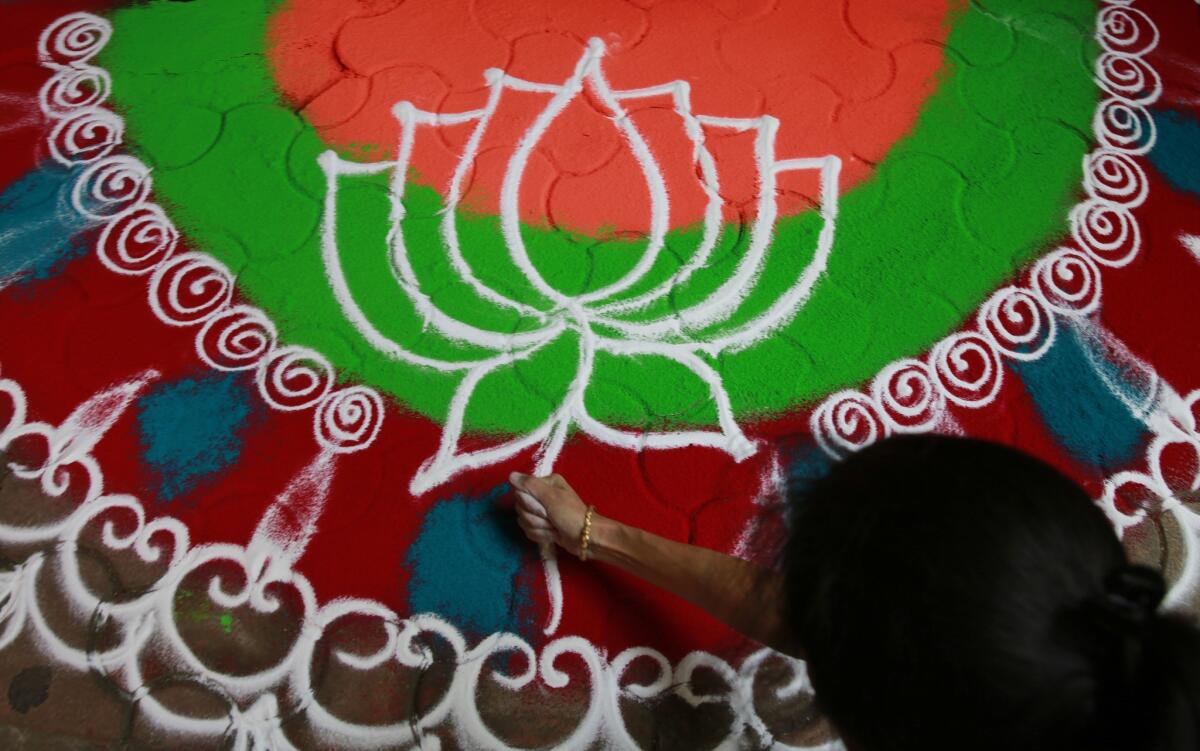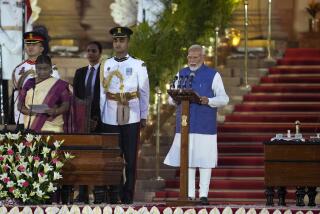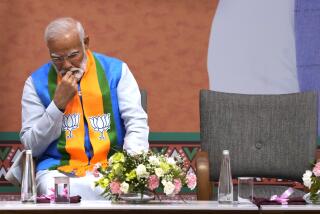State elections in India give boost to Modi

- Share via
Reporting from Mumbai, India — India’s governing Hindu nationalist party was declared the winner Sunday in two state assembly elections, giving a boost to Prime Minister Narendra Modi’s economic reform agenda.
The strong showing by the conservative Bharatiya Janata Party solidified Modi’s control over India just five months into his tenure by making his party the dominant player in two key state governments.
The BJP won a majority of seats in Haryana, a northern state that includes suburbs of the capital New Delhi, and a near-majority in Maharashtra, the economic juggernaut comprising the financial center Mumbai.
Modi, who took power in May after leading the party to a resounding victory in national elections, campaigned furiously for the lesser watched statewide polls, addressing dozens of rallies in the two states. His message of economic renewal, clean governance and nationalist pride has resonated among Indians who are increasingly fed up with corruption and cronyism that are seen to have slowed the country’s growth.
The BJP won 47 out of 90 seats in Haryana – where it had never before won more than 10% -- and was projected to win 122 out of 288 seats in Maharashtra, nearly tripling its previous tally, according to Times of India projections. That meant the party would have to form a governing coalition with one or more smaller parties, although it was likely to nominate the chief minister, the state’s top post.
The result in Maharashtra was particularly impressive because it came just weeks after the party broke a 25-year alliance with the Shiv Sena, another right-wing Hindu party with deep roots in the state. BJP leaders gambled that popular support for Modi was strong enough that they didn’t need the Shiv Sena, which had historically been the senior partner in the alliance.
“Such a mandate, which is a very clear indication of the approval of your personality and your party and policies, it unfreezes you from any kind of humility and you can take aggressive, bold decisions,” said A.K. Verma, chairman of the political science department at Christ Church College in the northern city of Kanpur.
Modi has announced plans to rebuild India’s moribund manufacturing sector, streamline regulation, offer bank accounts to the poor and improve cleanliness and sanitation. But some supporters worry that his efforts have not been ambitious enough, arguing that India needs wholesale change to compete with fast-growing economic rivals such as China.
BJP leaders say the results will give Modi more freedom to experiment with economic initiatives in a country where state officials hold much of the responsibility for implementing policies. Despite its majority in the national parliament, the BJP controls just a handful of India’s 30 state governments.
The election results, announced after voting took place Wednesday, marked another setback for the Indian National Congress, the party of the Nehru-Gandhi family that has ruled India for most of its history as an independent nation. Congress, on the heels of its worst-ever showing in national elections in May, finished a distant third in both states.
“To add two more important states is a big boost that will help us implement our policies smoothly,” Madhav Bhandari, the BJP’s spokesman in Maharashtra, said in an interview. “Emerging as the single largest party in Maharashtra, which has been Congress’ bastion, is a positive sign as well.”
Follow @SBengali for news from South Asia
Special correspondent Parth M.N. contributed to this report.
More to Read
Sign up for Essential California
The most important California stories and recommendations in your inbox every morning.
You may occasionally receive promotional content from the Los Angeles Times.











